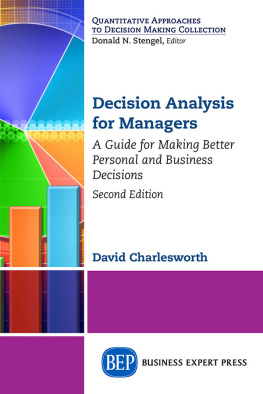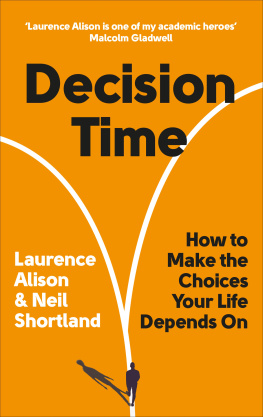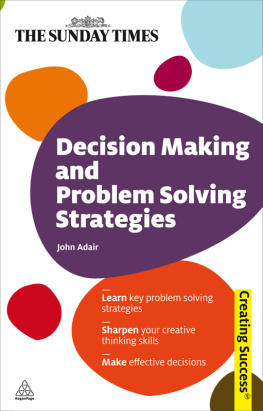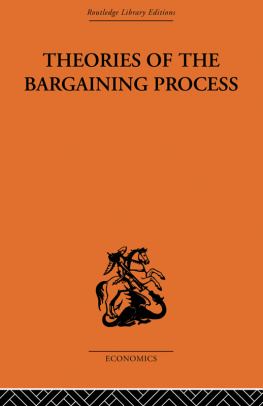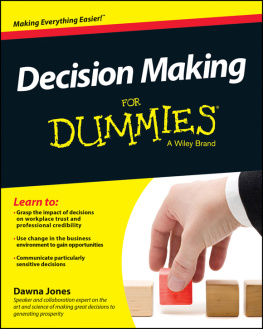Contents
Guide
Page List
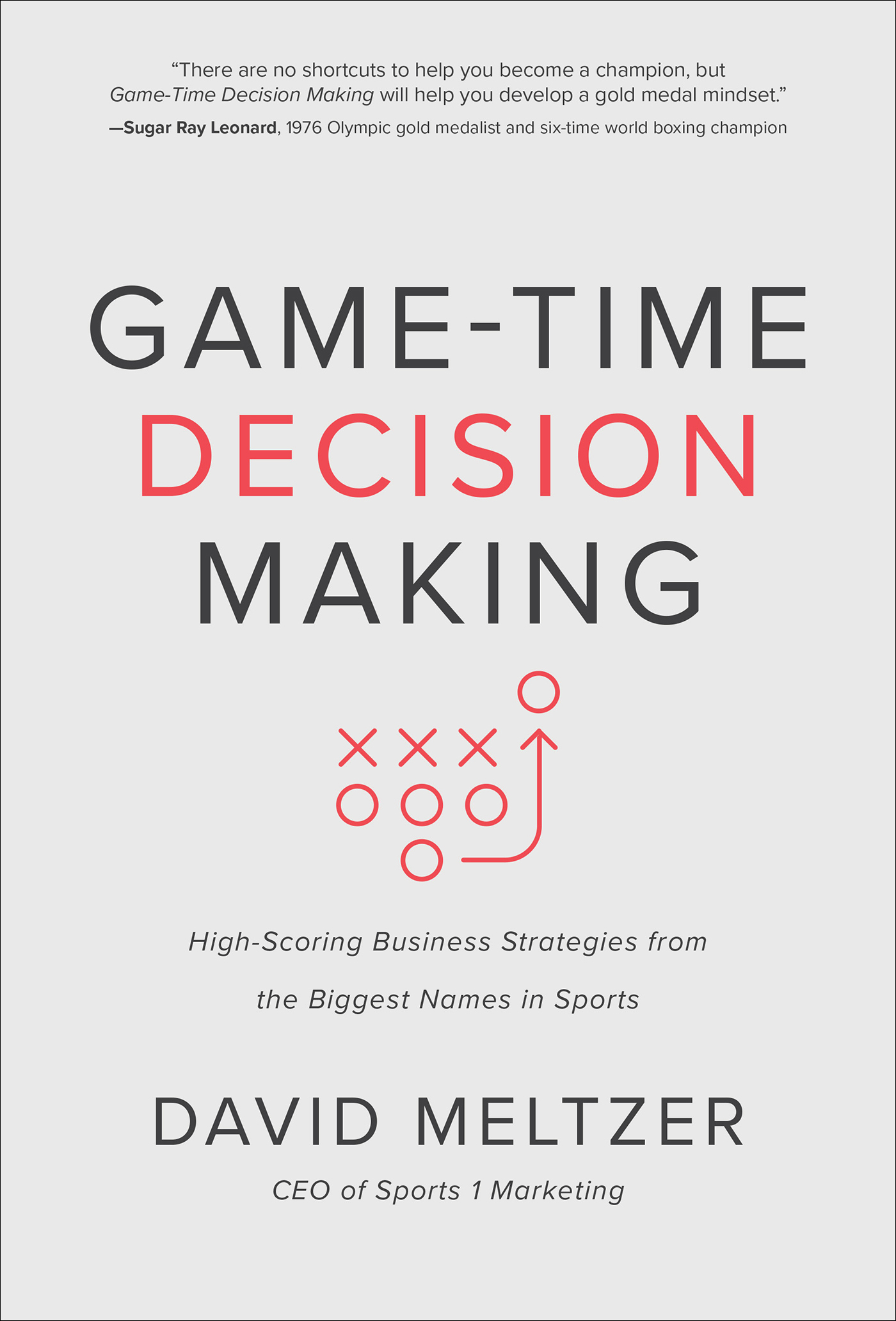

To my beautiful wife, Julie, and my M&MsMarissa, Mia, Marlena, and Milesas well as anyone else who should be acknowledged... especially my mom!
Copyright 2019 by McGraw-Hill Education LLC. All rights reserved. Except as permitted under the United States Copyright Act of 1976, no part of this publication may be reproduced or distributed in any form or by any means, or stored in a database or retrieval system, without the prior written permission of the publisher.
ISBN: 978-1-26-045262-4
MHID: 1-26-045262-X
The material in this eBook also appears in the print version of this title: ISBN: 978-1-26-045261-7, MHID: 1-26-045261-1.
eBook conversion by codeMantra
Version 1.0
All trademarks are trademarks of their respective owners. Rather than put a trademark symbol after every occurrence of a trademarked name, we use names in an editorial fashion only, and to the benefit of the trademark owner, with no intention of infringement of the trademark. Where such designations appear in this book, they have been printed with initial caps.
McGraw-Hill Education eBooks are available at special quantity discounts to use as premiums and sales promotions or for use in corporate training programs. To contact a representative, please visit the Contact Us page at www.mhprofessional.com.
TERMS OF USE
This is a copyrighted work and McGraw-Hill Education and its licensors reserve all rights in and to the work. Use of this work is subject to these terms. Except as permitted under the Copyright Act of 1976 and the right to store and retrieve one copy of the work, you may not decompile, disassemble, reverse engineer, reproduce, modify, create derivative works based upon, transmit, distribute, disseminate, sell, publish or sublicense the work or any part of it without McGraw-Hill Educations prior consent. You may use the work for your own noncommercial and personal use; any other use of the work is strictly prohibited. Your right to use the work may be terminated if you fail to comply with these terms.
THE WORK IS PROVIDED AS IS. McGRAW-HILL EDUCATION AND ITS LICENSORS MAKE NO GUARANTEES OR WARRANTIES AS TO THE ACCURACY, ADEQUACY OR COMPLETENESS OF OR RESULTS TO BE OBTAINED FROM USING THE WORK, INCLUDING ANY INFORMATION THAT CAN BE ACCESSED THROUGH THE WORK VIA HYPERLINK OR OTHERWISE, AND EXPRESSLY DISCLAIM ANY WARRANTY, EXPRESS OR IMPLIED, INCLUDING BUT NOT LIMITED TO IMPLIED WARRANTIES OF MERCHANTABILITY OR FITNESS FOR A PARTICULAR PURPOSE. McGraw-Hill Education and its licensors do not warrant or guarantee that the functions contained in the work will meet your requirements or that its operation will be uninterrupted or error free. Neither McGraw-Hill Education nor its licensors shall be liable to you or anyone else for any inaccuracy, error or omission, regardless of cause, in the work or for any damages resulting therefrom. McGraw-Hill Education has no responsibility for the content of any information accessed through the work. Under no circumstances shall McGraw-Hill Education and/or its licensors be liable for any indirect, incidental, special, punitive, consequential or similar damages that result from the use of or inability to use the work, even if any of them has been advised of the possibility of such damages. This limitation of liability shall apply to any claim or cause whatsoever whether such claim or cause arises in contract, tort or otherwise.
Contents
by Tilman Fertitta
Foreword
W hen I first met David Meltzer, I was simply excited to discuss my new book Shut Up and Listen! about the hard truths that drive success; and yet I actually learned that David and I had a lot in common. David had excelled in the technology space early in his career and found equally as much success (or more) as a sports executive. He came to my office to record an episode of his popular podcast, The Playbook, where I shared some of my philosophies and strategies that helped me build my multibillion-dollar hospitality empire: Fertitta Entertainment, Landrys Inc., Golden Nugget Casinos and Hotels, and the NBAs Houston Rockets. I learned that David had also built an empire, lost it, but eventually built another. What struck me upon my initial meeting with David was a simple phrase that we both believe in, a phrase that I would say is the key to Game-Time Decision Making: Get out of your own way.
The countless successes Ive had over my career, which have also afforded me the dream opportunity to buy my hometown Houston Rockets franchise, all boil down to the ability to make consistent and efficient decisions. So many of us get in our own way and prevent ourselves from reaching our potential that we tend to be our own worst enemies, especially those of us who resist change. Having the awareness and mindset to make the right decision is what separates the biggest names in sports and business from the rest. Its the difference between great athletes such as James Harden and the twelfth man on an NBA roster, or between Warren Buffett and pretty much everyone else. Those who can make tough calls (and be right), no matter how critical the situation, are those who will win. When you can make intentional decisions with consistency, you will succeed more often than not, and that approach pays off in the long run with big wins!
No matter what game youre playing, teaching others to make the right decisions is even more important for leaders. If you can equip others with the ability to make informed and well-reasoned calls, your impact is scalable. This is the core of Davids approach to Game-Time Decision Making: to empower you and those around you with the awareness and ability to make the right call when the game is on the line and the pressure is high.
Ive always said that in order to thrive as a business leader you need four core fundamentals: a great product, an understanding of your financials, a good grasp on operations, and the ability to sell and market your business. The ability to choose the right path, take the right risks, and implement the new skills or knowledge you gain along the way is solely dependent on your decision making. This begs the question: How can we set ourselves up for successful decision making? Realize your talents, gifts, and competencies, and determine how those show a clear path to making money or not.
Letting your talents guide your path is a strategy that paid off for me personally. As a young child, I didnt watch cartoons, instead preferring to play business by carrying a briefcase (and a dealmaking attitude) with me. I carried that knack with me as I grew, eventually building a multibillion-dollar organization from an initial $6,000 loan when I was in my early twenties. I have seen the business world evolve since building my first hotel in Galveston in 1986, and I know that those who embrace change and display a willingness to grow will always be the individuals who achieve the greatest heights. The phrase, weve always done it that way, is never a good explanation or justification. Even if 95 percent of your business is perfect, working on that remaining 5 percent is essential. You need to place greater importance on embracing change in order to stay in the game and win in the long term. Of course, there is always a need to make big decisions when there is change occurring.
The strategies that David outlines in his book will empower you to make the right calls in



